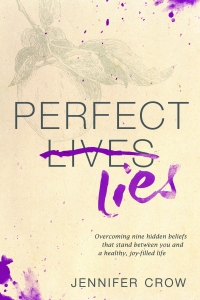As the kids settled into bed last night, hollering for “Mommy!” the umpteenth time, I snapped. Staring at the mound of dishes still dirty in the sink, thinking about the four loads of laundry yet to be folded in the bedroom, I wondered how on earth I could be so tired at the end of the day. Never mind that the kids were up at 6:30. Or that we went to the grocery store. Twice. Or that we cleaned a corner of the living room that had been begging for attention for at least a month. Or that I kept the kids occupied while my husband searched for jobs and returned e-mails and phone calls.
The day had been full. I was empty. And still I felt like I wasn’t enough or hadn’t done enough.
 I was believing a lie that Jennifer Crow address in her new book Perfect
I was believing a lie that Jennifer Crow address in her new book Perfect Lives Lies. The lie that says I must prove myself because my worth depends on what I do.
Crow’s book targets nine lies that keep us — especially women, I think — from having a healthy, joy-filled life. She speaks from her experience with an unidentifiable illness that plagued her for years. This health crisis drove her to examine her life and combat the lies she’d been believing. Health returned to her body as she found freedom from the crippling lies. 
I could identify with many of the lies she talks about it in the book. And the author is super honest about her own journey: how her life might have looked perfect on the outside but was a mess on the inside. Crow offers hope to women who desperately want a happy life and feel like they’re missing something, even though they might be doing everything “right.”
That said, I had a hard time with the writing style of the book. Although she’s writing personal stuff and trying to connect with readers, I got a little lost in the jumble of words sometimes. The book didn’t flow well for me.
However, Crow offers a guide for meditative prayer, which she wholeheartedly endorses. For her, the key to overcoming these lies was forming new word pictures in her mind of truths. So, even though some of her word pictures were a little bit different — like Jesus washing her hair — she found freedom by examining the roots of these lies in her life and substituting pictures of Jesus in the midst of hurtful situations.
It’s not a book to breeze through but one that needs time and space for contemplation and putting into practice what she offers.
—————————-
In exchange for this review, I received a free copy of the book from Tyndale House Publishers.

Leave a Reply